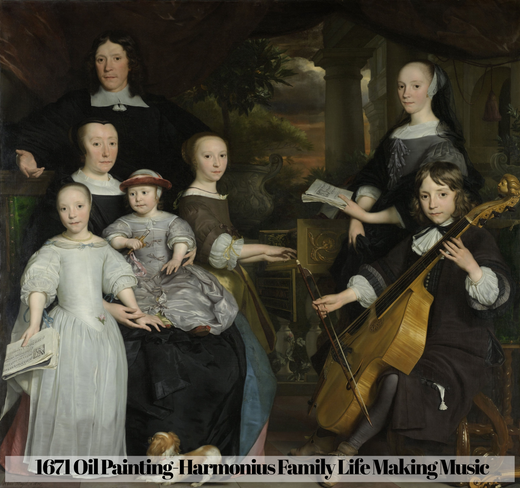
Creating a Feeling of Family and Community - Let's Make Music Together
Share
Cave men created musical instruments – animal bones were banged together and horns were blown – warning of danger, calling people together, marking key events – ceremonies. Findings from prehistoric archaeological sites suggest that music was significant to early communities. These primitive sounds evolved into recognizable patterns as human cognition developed. Along with prehistoric art, it was one of the earliest forms of community, and was proven that “early cultures with a strong musical tradition thrived whereas other cultures without a musical tradition struggled to survive (David Francis ‘The Powerful Role of Music in Society’ 2008).

One reason for this is because music evokes strong emotions and heightened states of awareness. We associate strong emotions with evolution (reproduction and survival) and this is why traditionally societies with a musical culture have been better able to flourish, because the music coordinates their emotions, helps important messages to be communicated and motivates individuals to identify with and to support other members within their community. (Susan Hallam ‘The Power of Music 2010).
BONDS BETWEEN ADULT AND BABY
In addition to its important role in the development of community, music also plays an important part in individual human social development, specifically in the early years. Per David Francis of The Performing Rights Society states, music ‘stimulates fetuses and infants in such a way as to promote their well-being’. “This is because modern music is thought to have originated from early interactions between mother and child known as ‘motherese’. Motherese is observed when adults with child caring responsibilities, specifically mothers, communicate intention and meaning to their babies using vocal-gestural communication.”

“The function of motherese is to strengthen the bond between adult and baby and to help the infant to acquire language. Remarkably, motherese is similar across cultures despite differences in language, and these early interactions between mother and child have been found to have ‘an essentially musical quality’. Playing musical instruments, singing or listening to music therefore invokes strong feelings of well being in the individual, even if only at a subconscious level, because it reminds us of our infancy and our connection to others. This is why even as adults, music is vitally important to our continuing personal and social development.”
PLAYING RATHER THAN LISTENING
Playing musical instruments (as opposed to simply listening to music) is particularly important for human social development because music making is fun and uses different skills to the ones that most people usually employ on a day to day basis. This means that making music is relaxing and can relieve feelings of stress and anxiety. In fact, there is now a growing body of research which demonstrates that playing musical instruments is good for you in terms of both improved physical and mental health.

Research from 2001 has shown that improved mental and physical health in the individual increases their capacity for social integration. This is because when an individual feels positive, relaxed and confident they are much more able to be happy in their community. This in turn strengthens the community because when all the members of a community are fully integrated everyone is able to contribute a diverse and unique set of skills and talents to that community.
MUSIC DOES NOT DISCRIMINATE BETWEEN AGE, CULTURE OR ABILITY
Because music is non-verbal, it is a language that equalizes people of all backgrounds, ages, diversity. Coming together in our modern times is more important than ever where social isolation and anxiety is becoming increasingly common.
We’ve all felt the community and feeling of participation singing Happy Birthday together or by dancing together at a party.
Music’s meaning goes beyond words and enables sharing without words.
PLAYING MUSICAL INSTRUMENTS MAKES OUR COMMUNITY BETTER
Listening to music and singing together has been shown to create a sense of group identity and may be particularly potent in bringing about social integration because it directly impacts on the neuro-chemicals in the brain which facilitate feelings of closeness and connection.
Music improves people’s feelings of well being and connection, which in turns helps them integrate into their community, hence a stronger community for all.
One 2017 study found that playing musical instruments, singing and dancing also resulted in greater positive emotions which suggests that people feel closer to one another when playing music. This is due to the release of endorphins which these types of activity facilitate. This, plus the fact that music has been linked to the release of dopamine (the chemical that causes us to feel pleasure) means that music makes us feel good and connected with others, particularly when we are making music ourselves.
Music is able to bring a diverse group of people together in the community because it transcends language limitations- instead providing its own language of rhythm and melody to enable its players and users to communicate with each other non-verbally. Providing opportunities for members of a community to be around each other in this way promotes familiarity and the formation of healthy relationships and helps to engender a sense of belonging for those who participate. It is apparent then that music can help us to develop a more harmonious society if access to it is provided and engagement promoted.
Researchers have proven that music enhances group identity and that playing musical instruments in a group helps us to ‘synch up our brains and co-ordinate our body movements with others’. It is suggested therefore that coordinating movement through music may increase our sense of community and make us more social.
Thank you to Percussion Play for the Ideas for this article.
